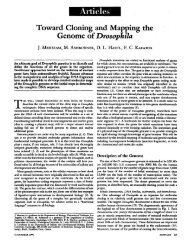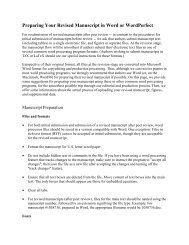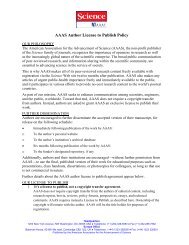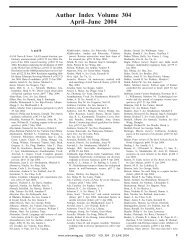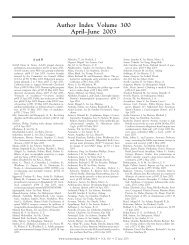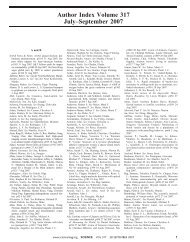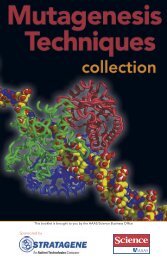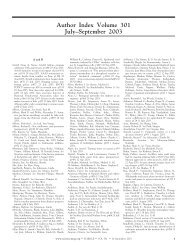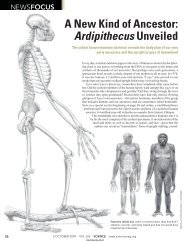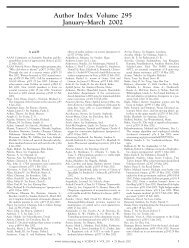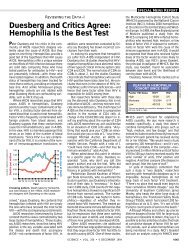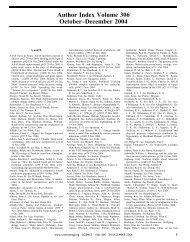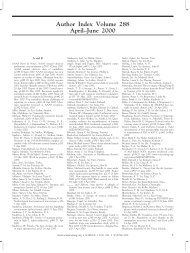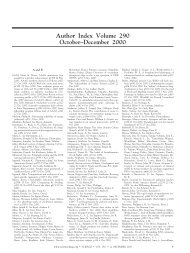Chinese Academy of Sciences (PDF) - low res version
Chinese Academy of Sciences (PDF) - low res version
Chinese Academy of Sciences (PDF) - low res version
Create successful ePaper yourself
Turn your PDF publications into a flip-book with our unique Google optimized e-Paper software.
CREDIT: COURTESY OF CAS<br />
he “learnt how to make use <strong>of</strong> modern <strong>res</strong>earch facilities and had access to current<br />
literature,” he writes. Now back in his native Nigeria, where he is a reader (pr<strong>of</strong>essor)<br />
in chemistry at the Federal University <strong>of</strong> Technology Owerri, Oguzie maintains close<br />
ties with his colleagues at the institute and says that his experiences there helped him<br />
successfully apply for grants to buy some <strong>of</strong> the same <strong>res</strong>earch equipment he used in<br />
China. “This means that my lab is comparatively better equipped than most similar labs<br />
[in Nigeria] studying corrosion, which is attracting a lot <strong>of</strong> postgraduate students and as<br />
well as inte<strong>res</strong>t from oil and gas companies,” he writes. (Corrosion is a major problem<br />
on the equipment used for oil and gas drilling.)<br />
One <strong>of</strong> Oguzie’s students, Benedict Ikenna Onyeachu, is now at IMR on a TWAS-CAS<br />
fel<strong>low</strong>ship <strong>of</strong> his own, comparing the corrosion properties <strong>of</strong> two different materials. He<br />
plans to return to Nigeria next year, where he hopes that his <strong>res</strong>earch can help local<br />
industries. In addition, he says, “I owe young minds (especially scholars) in my country<br />
the duty <strong>of</strong> training them and al<strong>low</strong>ing them to acquire and appreciate the knowledge I<br />
have gained thus far.”<br />
Another former TWAS-CAS fel<strong>low</strong> who is looking to apply his training to immediate<br />
problems back home is Emmanuel Iyayi Unuabonah, who in 2006 spent time at the<br />
Institute <strong>of</strong> Soil Science in Nanjing. A graduate student at the time, he learned to analyze samples using scanning electron<br />
microscopy and X-ray diffraction equipment as well as “how to design a workable experiment, laboratory ethics, and how<br />
to write articles for peer-reviewed journals with high-impact factors,” he says. Now a senior lecturer in chemistry at Redeemer’s<br />
University in Nigeria, he is working on “developing <strong>low</strong>-cost materials with high efficiency for removing micropollutants<br />
from water and wastewater,” work that has been helped by his continuing relationship with his mentor in Nanjing.<br />
Unuabonah credits his experience there with improving both his <strong>res</strong>earch and teaching abilities.<br />
Kifayatullah Khan, who is now doing a TWAS-CAS Postgraduate Fel<strong>low</strong>ship at the Research Center for Eco-environment<br />
<strong>Sciences</strong> as part <strong>of</strong> his Ph.D. work at the University <strong>of</strong> Peshawar in Pakistan, hopes his experience will have similar <strong>res</strong>ults.<br />
“Once I enhance my educational and technical skills, then I will be able to contribute something in the development <strong>of</strong><br />
my motherland,” he explains. “With improved p<strong>res</strong>entational and communicational skills I will be able to teach in a better<br />
way and will inspire students in innovation and <strong>res</strong>earch, which are the key factors in the development <strong>of</strong> a nation.” Khan<br />
plans to analyze how heavy metals in soil and ground water may make their way into agricultural and dairy products, and<br />
ultimately the humans who consume them.<br />
When attendees gather for the TWAS 12th General Conference and 23rd General Meeting in September this year, they<br />
may not be treated to anything as dramatic as a first glimpse <strong>of</strong> China’s scientific landscape or breaking news <strong>of</strong> the country’s<br />
first spaceflight, but they may still find themselves surprised by how far their hosts have come scientifically—and what<br />
they’re planning to do next.<br />
(L to R) Bai Chunli, C.N.R. Rao, and Bruce Alberts at the TWAS<br />
14th General Meeting, 2003 in Beijing.<br />
TWAS Honors and Awards<br />
Each year TWAS elects 45 to 50 new members who have made significant<br />
contributions to science, and who either live and work in a developing<br />
country or have actively promoted science in developing countries.<br />
Mainland China currently has 160 TWAS members.<br />
TWAS also awards a number <strong>of</strong> prizes that recognize excellent work by<br />
scientists in developing countries. Over the years, 42 <strong>res</strong>earchers in China<br />
have won such prizes.<br />
Dr. Emeka Oguzie from Nigeria, 2005 CAS-TWAS<br />
Postdoctoral Fel<strong>low</strong>ship Awardee in the Institutes<br />
<strong>of</strong> Metal Research.<br />
The CAS-TWAS-WMO<br />
Forum<br />
The CAS-TWAS-World Meteorological<br />
Organization Forum (CTWF) was<br />
founded in 2000 with the goal <strong>of</strong> improving<br />
climate modeling and prediction. At<br />
the annual CTWF symposia, mathematicians,<br />
physicists, and atmospheric and<br />
oceanic scientists come together in China<br />
to discuss gaps in knowledge related<br />
to modeling and how to fill them. The<br />
emphasis <strong>of</strong> the 2011 workshop was on<br />
building the <strong>res</strong>earch capacity <strong>of</strong> participants,<br />
establishing connections among<br />
them, and managing the local impact <strong>of</strong><br />
global climate change.<br />
“Once I<br />
enhance my<br />
educational and<br />
technical skills,<br />
then I will be able<br />
to contribute<br />
something in the<br />
development <strong>of</strong><br />
my motherland.”<br />
Editorial News Report<br />
45



